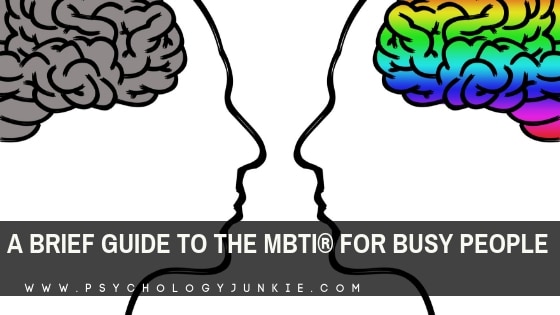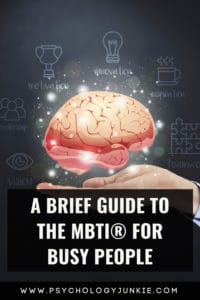A Brief Guide to the MBTI® for Busy People
So you keep hearing about this MBTI® thing. Maybe you’ve even taken a free knock-off Myers-Briggs-ish personality test. But what are all these letters REALLY about? Is the MBTI® just a glorified Buzzfeed test? Why do people take it so seriously? Is it all a bunch of narcissistic mumbo-jumbo aimed at millennials who want to feel good about themselves while they eat their avocado toast? Well, here’s your quick and easy guide to what the Myers-Briggs assessment is essentially all about.
Not sure what your personality type is? Take our new personality questionnaire! You can also take the official MBTI® online here.

This article contains affiliate links. I only recommend products I truly believe in.
A Brief Guide to the MBTI® for Busy People
The History of the MBTI®
The theory of psychological types is based on the work of Swiss psychoanalyst Carl Jung. Jung was famous for advancing analytical psychology and creating the foundation of psychological type. Isabel Briggs Myers and her mother, Katherine Cooks Briggs, implemented the ideas of Carl Jung to create the MBTI®. The questionnaire is the culmination of 20 years of research by Briggs Myers with her mother and the help of thousands of other individuals, including psychoanalysts, therapists, teachers, and analysts. After the questionnaire is completed, you will be sorted into one of 16 personality types that each have a four-letter code.
What Do Those Letters Mean?
E – Extrovert. You get your energy from interaction with the world around you. The outer world is the REAL world to you and you are energized when you’re engaged with your surroundings.
I – Introvert. You get your energy from the inner world of reflection and ideas. The inner world is the REAL world to you and you’re energized when you’re immersed in thoughts and introspection.
S – Sensor. You’re a realist. You focus on what exists and how to use it in a practical, resourceful way. You like information you can verify through facts and tangible data. You’re observant of the outside world and are tuned into the present moment.
N – iNtuitive. You’re focused on speculating and envisioning hypothetical scenarios. You predict, imagine, and contemplate future possibilities. You are more focused on the future than the present and like to change things up just for the sake of it. The present is often sacrificed for future possibilities.
T – Thinker. When you make a decision you focus on logic, cause and effect, pros and cons. You try to step outside of a situation to see it objectively and impersonally. You value truth over tact.
F – Feeler. When you make a decision you focus on how it will impact the people involved. You value empathy and passion and focus primarily on ethics, values, and the personal implications of a decision.
J – Judger. You want to know what to expect and what the long-term plan is. You want to do one thing at a time and tend to get stressed when multi-tasking. You enjoy having a structured, organized life and you tend to work before you play.
P- Perceiver. You like to follow your impulses and you get a thrill from starting new projects (the finishing part can be hard, though). You like to live a spontaneous, flexible lifestyle and you tend to be skilled at multi-tasking and working with unknowns.
Information-Gathering Versus Deciding
Sensing and Intuition are information-gathering functions. When we gather data from the outside world we use one of these preferences more easily than the other. Sensors notice concrete facts, details, and actualities. They focus on experiences and tend to be realists. They want to get their hands on things to understand them and they look for evidence and proven methods. Intuitives notice underlying meanings, patterns, and abstract connections. They tend to be more imaginative than realistic. They want to explore hypotheticals and generate ideas and future possibilities. They try to do things in new ways rather than use past methods.
Feeling and Thinking are decision-making processes. When we are faced with a decision that calls for either personal or impersonal analysis, we usually will choose one method over the other. Feeling types prioritize ethics, values, and personal analysis. They step into a situation to understand how it will impact the people involved. Thinking personality types focus on logic, causality, and pros and cons when making a decision. They step out of the situation to get an objective view of what is happening.
Your Personality Type and Communication
One of the most beneficial byproducts of learning about personality type is communicating better with people who process things differently than you do. Here are some quick guidelines for communicating with the different types:
Introverts – Give them personal space and plenty of time to think over responses before expecting an answer. Invite them to social events, but don’t take it personally if they decline.
Extroverts – Ask questions and let them think out loud. Think of the conversation as an interactive experience. Remember that they like to be engaged with a variety of people and experiences. Understand that sometimes when they’re “thinking out loud” they may not be 100% clear on their decision yet.
Sensors – Be literal and straightforward. Don’t beat around the bush, exaggerate, or skip around in time. Use facts and evidence to back up assertions. Focus on practical application or real-world experiences.
Intuitives – Be imaginative and future-oriented. Explain the big picture before getting into the details. Use metaphor and analogy to explain things. Focus on concepts, theories, change, and innovation.
Thinkers – Explain the logic behind your conclusions. Weigh the pros and cons or cause and effect of a decision. Be direct and straightforward. Emotional appeals to these types are likely to seem manipulative rather than heartfelt.
Feelers – Show compassion and empathy. Examine the emotional impact of decisions on the people involved. Acknowledge the feelings of others and be attentive to their words. Be tactful in your approach.
Judgers – Focus on one subject at a time with judgers, they can get stressed when the conversation trails off into many different tangents and topics are left unfinished. Ask for their help in organizing a plan. Don’t interrupt their train of thought. Understand that they will be stressed with things left undecided.
Perceivers – Give them options and alternatives to play with. Don’t push them into a decision until they’ve had a chance to look at all the information. Understand that they will be content with things left undecided and need more time to examine all the options.
Your Personality Type Strengths and Weaknesses
Each personality type has a dominant mental process and an inferior mental process. Our inferior processes tend to be the sources of many of our weaknesses and embarrassments while our dominant processes tend to be easier for us to master and use effectively.
ESTJs, ENTJs – Dominant Extraverted Thinking/Inferior Introverted Feeling
ETJs enjoy creating structure and order in the world around them. They take decisive and effective action, moving quickly to accomplish goals and solve problems. ETJs are typically pragmatic, no-nonsense, and focused on efficiency.
ETJs can struggle to develop a nuanced, understanding view of the people around them. They can get so caught up in focusing on objectives that they lose sight of their own values, feelings, and personal ethics. They may become impatient with the personal problems and emotions of other people, especially if they get in the way of getting a goal achieved.
ISTPs, INTPs – Dominant Introverted Thinking/Inferior Extraverted Feeling
ITPs are gifted at sorting out data and finding inaccuracies as well as connections. They want to understand how things work, not always to achieve a goal, but for the sake of understanding. They are skilled at creating formulas to solve problems and understanding systems and the cause and effect of various actions or decisions.
ITPs can struggle to recognize or understand the emotional motivations of the people around them. It can be hard for them to express themselves emotionally or pick up on social cues and customs. They may feel that being tactful or adhering to social expectations is a waste of time or personally frustrating.
ESFJs, ENFJs – Dominant Extraverted Feeling/Inferior Introverted Thinking
EFJs have a gift for understanding the emotional dynamics of the people around them. They quickly pick up on unmet needs, harmony or lack thereof, discomfort, or hidden expectations. Peacemaking and helping people work through interpersonal issues is something they’re usually skilled at.
EFJs can struggle to stay objective when a decision impacts people. They tend to get so caught up in the human dynamics that the impersonal details get cloudy and confusing. They may get stuck thinking in unproductive circles or trying to find the most socially desirable answer over the most logical one.
ISFPs, INFPs – Dominant Introverted Feeling/Inferior Extraverted Thinking
IFPs focus on creating inner harmony and meaning in their lives. They believe in understanding the nuances of each individual and creating a tolerant, accepting atmosphere. They are concerned with ethics and morality, but not in the rule-abiding sense. They analyze good and evil and question rules and standards to try to determine the roots and truth of it all. They are usually gifted in understanding people one-on-one and are typically gentle and patient.
IFPs can struggle to create structure and organize their tasks in the most efficient manner. They can also struggle with detaching from their feelings and viewing a situation in a purely objective sense. When dealing with criticism it can be difficult for them not to take it personally.
Read This Next: INFPs, ISFPs and Empathic Mirroring
ENFPs, ENTPs – Dominant Extraverted Intuition/Inferior Introverted Sensing
ENPs have a gift for seeing connections, possibilities, and patterns in the outside world. They enjoy generating ideas for the future and asking “What if?” questions. They like to change things, innovate, and question. They tend to see alternatives where other people see only one solution or possibility. Open-mindedness, innovation, and creativity tend to come naturally to them.
ENPs can struggle to take care of their tangible, physical needs. They may fail to prioritize their health or struggle to create healthy routines. They enjoy starting projects and generating ideas, but finishing projects and employing sustained, methodical effort can be exhausting for them.
Read This Next: The Unique Intelligence of ENFPs, ENTPs, INFPs and INTPs
INFJs, INTJs – Dominant Introverted Intuition/Inferior Extraverted Sensing
INJs tend to see underlying meanings, patterns, and implications that other people miss. They try to understand what’s going on in the background of every situation – what isn’t being said, what isn’t being shown, but what exists nonetheless. They are interested in seeing the long-term implications of current events and tend to have a strategic vision.
INJs can struggle to be aware of their external surroundings and the needs of the present moment. They can get so caught up in hypothesizing about future scenarios that they lose sight of the present. They can also become perpetually dissatisfied with the present because they are so anxious to make things better and progress towards a future ideal.
Read This Next: The Remarkable Similarities Between INFJs and INTJs
ESFPs, ESTPs – Dominant Extraverted Sensing/Inferior Introverted Intuition
ESPs are the ultimate realists. They are very aware of what’s happening around them and tend to be resourceful and pragmatic. They are good at troubleshooting during a crisis and finding creative solutions using what’s readily available. They are flexible, spontaneous, and skilled at adapting and blending in. They tend to have a fun, free-spirited nature and enjoy livening up the atmosphere and introducing people to experiences they otherwise might have missed.
ESPs can struggle to focus on the long-term implications of their decisions. They tend to be impulsive and focused primarily on the present moment. When they have to focus on long-term planning or work with a sustained, methodical effort they can feel restless and drained.
ISFJs, ISTJs – Dominant Introverted Sensing/Inferior Extraverted Intuition
ISJs collect facts and wisdom throughout their life that they implement as the need arises. They focus on their personal experiences and impressions, using every bit of knowledge they can to maximize the present moment and avoid repeating mistakes. They are gifted at creating consistency, stability, and routine. They also tend to have advanced inner-body awareness.
ISJs can struggle to innovate or try out new approaches to things because they prefer working with what they know. Being in new, unusual situations tends to cause them a lot of stress. They also can find it especially difficult to adapt or be spontaneous.
Read This Next: Here’s What it’s Like Inside the Mind of an ISFJ, ISTJ, ESFJ or ESTJ
What’s Next?
This guide gives you some of the very basic, but most important facts about personality type. Want to know more? Find out more about your personality type in our eBook, Discovering You: Unlocking the Power of Personality Type.
Other Articles You Might Enjoy:
How Others See You, Based on Your Personality Type
Here’s How You Respond to Grief, Based on Your Personality Type
What Each Myers-Briggs® Personality Type REALLY Wants to Talk About










Thanks so much for writing this article! It’s been wonderful to read a short summary of the MBTI. I’m an MBTI fan, and I’ve found it to be a wonderful way to understand the people around me; your article helped me understand the whole Myer-Briggs system much better. Thank you!
Thanks so much! I’m really glad that you enjoyed the article! 🙂
This sentence seems like you’re basically telling your reader they’re dumb- “You’ve taken the free knock-off test on 16 Personalities (and probably don’t realize you’re completely mistyped already)”.
Then you follow it with this- “Not sure what your personality type is? Take the most accurate free online personality indicator here.” And it almost sounds like you just trashed 16 personalities so that I would buy from you and not them. Or that something has happened and there is some bad blood there. Might be something you want to take a look at. It could definitely turn readers away.
I understand how it could seem that way so I went ahead and changed the wording a little bit. I personally don’t like the 16 Personalities test as an MBTI® practitioner because about 90% of the people who take it wind up being mistyped, but they get very attached on a specific type from the site. But I think I could have worded it better so thank you for making me aware of this!
I’m Amy, and I’ve been really bored lately with just the mundane things in my life. I read this and you helped me finally realize why I’ve been so bored and unproductive lately. Thank you so much!
It’s a wonderful post. Thank You so much for writing this post.
I’m so glad you liked it!
No price one w’d attach to valuable information such as relates to our day today life styles Thank you for this easy to understand post .